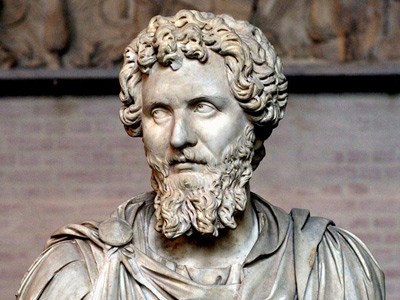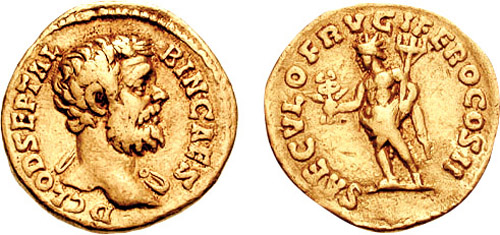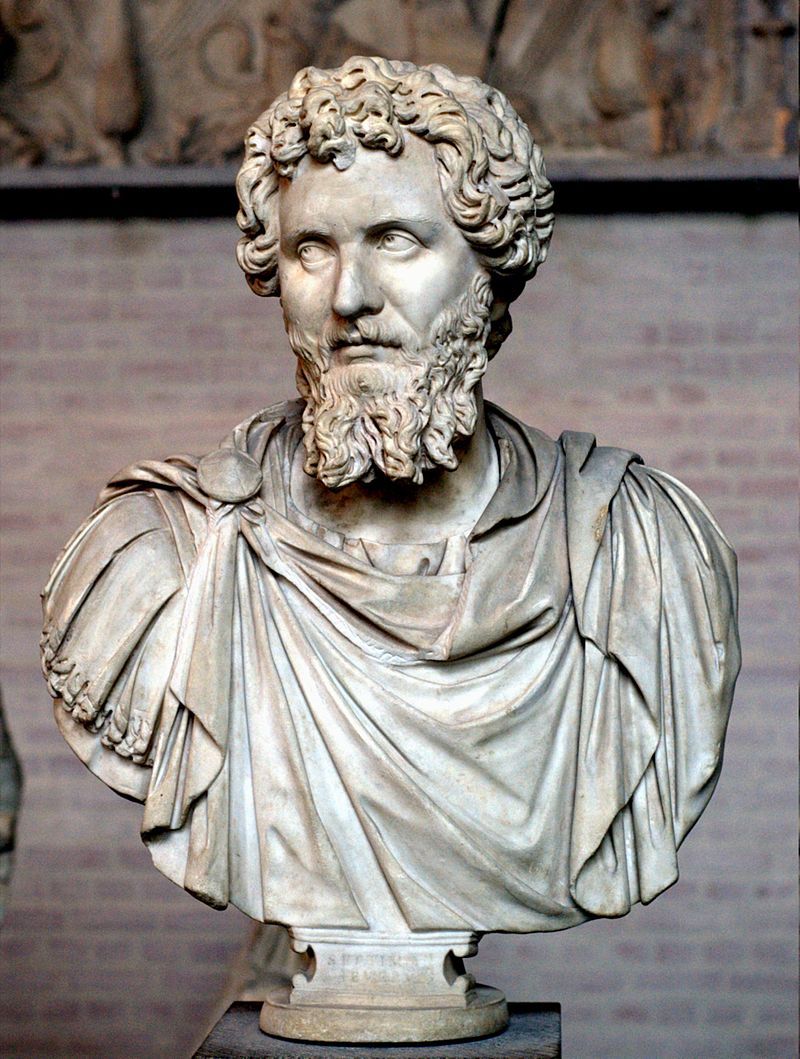Roman Civil War (193-197 AD)

The Year of the Five Emperors refers to the year 193 AD, in which there were five claimants for the title of Roman Emperor. The five were Pertinax, Didius Julianus, Pescennius Niger, Clodius Albinus and Septimius Severus. This year started a period of civil war where multiple rulers vied for the chance to become Caesar.
The political unrest began with the murder of Commodus on New Year’s Eve 192 AD. Once Commodus was assassinated, Pertinax was named emperor but immediately had aroused opposition from the Praetorian Guard. They plotted and carried out his assassination. Pertinax was killed while resisting. He was only emperor for three months. Didius Julianus, who purchased the title of emperor from the Praetorian Guard, succeeded Pertinax, but was ousted by Septimius Severus and executed on June 1. Severus was declared Caesar by the Senate but Pescennius Niger was hostile when he declared himself emperor. This started the civil war between Niger and Severus as both gathered troops and fought throughout the territory of the empire. Due to this war, Severus allowed Clodius Albinus, who he suspected as a threat to him, to be co-Caesar so that Severus did not have to preoccupy himself with imperial governance. This move allowed him to concentrate on waging the war against Niger. Most historians count Severus and Albinus as two emperors even though they ruled simultaneously. The Severan dynasty was created out of the chaos of 193 AD.
Fall of Commodus
Commodus’ sane rule began to fail when a close advocate, Cleander, was assassinated. This made Commodus start to fear for his life. He dealt with this fear through massacre of the nobles and aristocracy. He began removing himself from his identity as ruler ideologically by resuming his birth name instead of keeping the names that his father gave him when he succeeded to imperial rule. His behavior decayed further as he became more paranoid. He planned a huge massacre in Rome for New Year’s Eve 192 AD, in which he killed many of the nobles so that he could become the sole consul. Three nobles, Eclectus, Marcia, and Laetus, trying to survive and save their lives, arranged to have Commodus strangled. The assassins named Pertinax the new Caesar.
The person who planned the murder of Commodus is still a debated topic. Some sources name Pertinax as the mastermind of the assassination because he obtained imperial rule once Commodus was killed. The reason for this is that Pertinax’s enemies wanted to create enmity for Pertinax within Rome so they blamed him when they really had no idea who planned it.

These books are available for download with Apple Books on your Mac or iOS device
Pertinax
Pertinax gained his political clout by moving his way up the military ranks. He was proconsul of Africa, making him the first of several emperors who began their political roles in Africa. Since most of the nobles had been murdered in the New Year’s Eve massacre, Pertinax was one of the few high-ranking officials left to become the new emperor. Pertinax had a tough road to climb when he became Caesar because Commodus left his regime with major financial difficulties. However, Pertinax had his own troubles right away when he was accused of planning the death of Commodus. He may also have been accused of the murder of Cleander, Commodus’ advocate, whose murder had triggered Commodus’ paranoia.
Pertinax was a great contrast to Commodus. He was disciplined but lost the favor of the troops early since he took away all of the favors that Commodus gave them. This led to a plot to assassinate Pertinax by the Praetorian Guard. The plot was carried out on March 28 and Pertinax was killed trying to stop the coup. Didius Julianus was his successor as Caesar.
Didius Julianus
Didius Julianus gained power as proconsul of Africa, succeeding Pertinax in that position. Julianus was not just given the position of emperor after Pertinax’s death. He had competition in Pertinax’s father-in-law, Sulpicianus. The only way that Julianus gained the Senate’s favor was by outbidding Sulpicianus for the amount he would pay the troops. Julianus was originally accused of being Pertinax’s murderer. Two public figures used the public’s fear to take advantage of this crisis: Pescennius Niger, the governor of Syria, and Septimius Severus. Twelve days after Pertinax’s murder, Severus declared himself emperor in place of Julianus. The mobs, who regarded Julianus unfavorably, called on Pescennius Niger for assistance. Julianus was executed on June 1, just two months after Pertinax was killed.
Pescennius Niger
Niger began his career as the governor of Syria. Once the mobs started calling for his help, he became a rival to Severus since Severus believed that he should have total power and loyalty from the people of the empire. Niger ended up proclaiming himself emperor, which further angered Severus. Niger had allies in the eastern part of the empire so when Severus threatened him with troops, he gathered an army from his allies and fought Severus throughout the empire for two years. He eventually lost the civil war to Severus near the city of Issus.
Clodius Albinus

Albinus came into contention for the imperial office in 193. when he was asked to become emperor after the death of Commodus but rejected the proposition. However, he did eventually gain the title of Caesar because Severus needed assistance in controlling the empire while he was fighting Niger so that he could completely focus on the civil war. Severus and Albinus were considered enemies at the time but a treaty was signed between the two, which gave Albinus more power and the title of Caesar. Some sources say that this treaty was only honorary and only benefitted Severus, who only won because of Albinus’ support while not actually giving away any of his power as emperor. Albinus controlled Britain and this treaty would have given him power over Gaul and Spain. Most sources do not mention the treaty but they do say that it was a mere agreement between the two men so that Severus could attain his goal of defeating Niger. Albinus continued in this role as “Caesar” for three more years before a civil war broke out between him and Severus, resulting in Severus becoming the all-encompassing emperor.
Septimius Severus

Severus was, practically speaking, the emperor after Pertinax was assassinated. Some sources tie Severus and Pertinax together and call them allies, which would explain how Severus became so powerful during this chaotic year. Twelve days after the March 28th assassination, Severus made himself ruler with the Senate’s backing. He had Didius Julianus executed and made enemies of the other powerful nobles that had a possibility of becoming emperor, i.e. Niger and Albinus. He had originally wanted to take the throne after Commodus’ murder, but the haste with which the assassins named Pertinax emperor prevented that from happening. For the first few years of his reign, he spent his time preoccupied with the civil war he was waging against Niger in the eastern half of the Roman Empire The Roman Empire was the post-Republican period of ancient Rome. As a polity, it included large territorial holdings around the Mediterranean Sea in Europe, North Africa, and Western Asia, and was ruled by emperors. The first two centuries of the Roman Empire saw a period of unprecedented stability and prosperity known as the Pax Romana ('Roman Peace'). The Empire was later ruled by multiple emperors who shared control over the Western Roman Empire and the Eastern Roman Empire., so he shared the emperorship with Clodius Albinus. He even signed an agreement with Albinus to gain his support despite being his enemy and only gave Albinus the façade that he was Caesar. He never really gave Albinus powers in the empire. After he defeated both of his enemies, Severus got rid of their followers to imprint in the people’s minds that he was the all-encompassing Caesar. However, once he defeated Niger, he set his sights on his enemy Albinus and waged a civil war against him and eventually defeated him. Now that Severus had complete control of the empire, he began the Severan dynasty.
The Roman Empire was the post-Republican period of ancient Rome. As a polity, it included large territorial holdings around the Mediterranean Sea in Europe, North Africa, and Western Asia, and was ruled by emperors. The first two centuries of the Roman Empire saw a period of unprecedented stability and prosperity known as the Pax Romana ('Roman Peace'). The Empire was later ruled by multiple emperors who shared control over the Western Roman Empire and the Eastern Roman Empire., so he shared the emperorship with Clodius Albinus. He even signed an agreement with Albinus to gain his support despite being his enemy and only gave Albinus the façade that he was Caesar. He never really gave Albinus powers in the empire. After he defeated both of his enemies, Severus got rid of their followers to imprint in the people’s minds that he was the all-encompassing Caesar. However, once he defeated Niger, he set his sights on his enemy Albinus and waged a civil war against him and eventually defeated him. Now that Severus had complete control of the empire, he began the Severan dynasty.
HISTORY

RESOURCES
This article uses material from the Wikipedia article "Year of the Five Emperors", which is released under the Creative Commons Attribution-Share-Alike License 3.0.
© Stories Preschool. All Rights Reserved.









